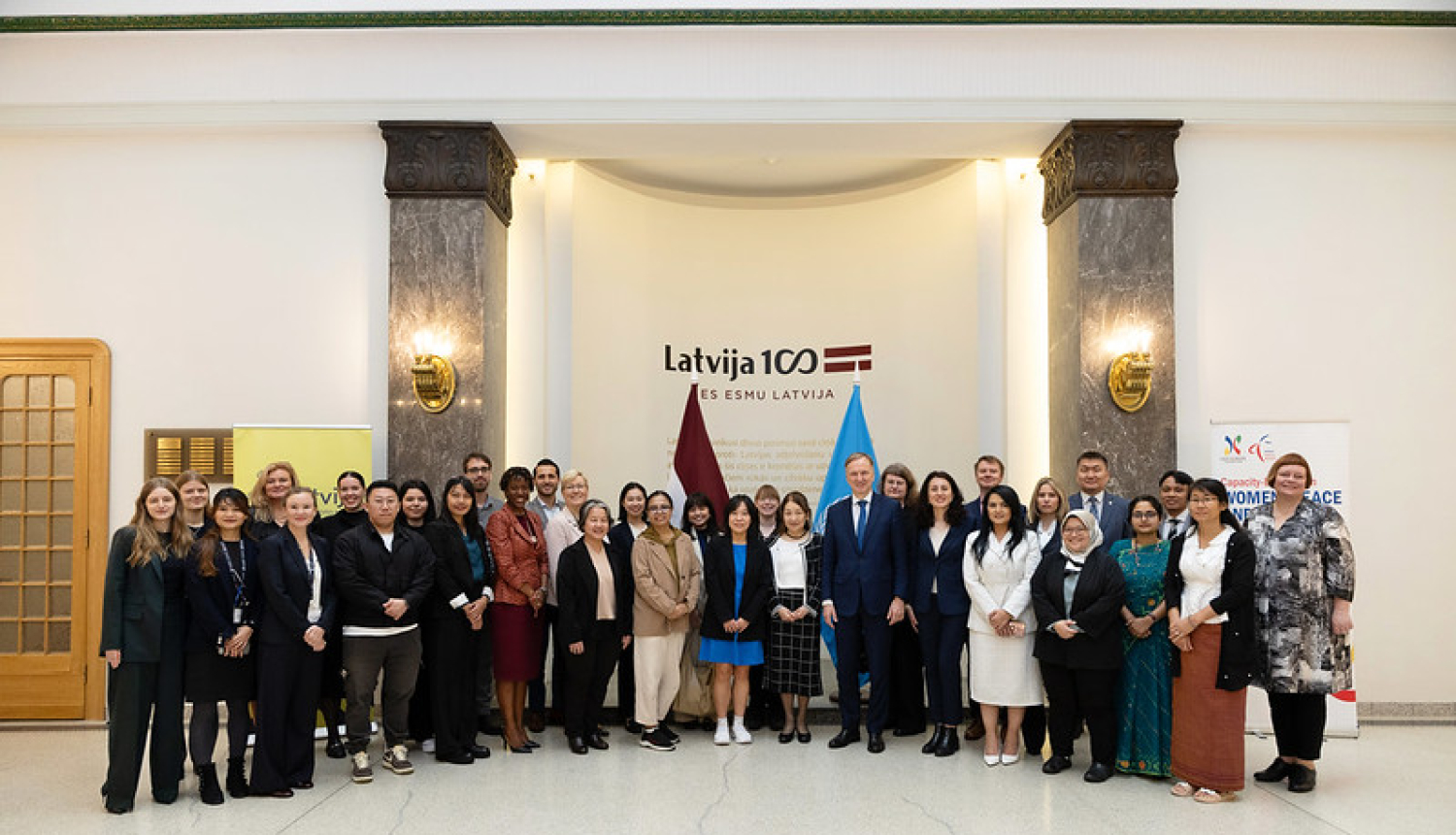From 19 to 21 May 2025, Riga was hosting a course in Capacity-Building Training on Women, Peace and Security jointly organised by the Ministry of Foreign Affairs of Latvia, the “Women For Security” association, and the Asia-Europe Foundation (ASEF).
In her opening remarks for the event, the Minister of Foreign Affairs, Baiba Braže, highlighted the importance of women’s participation in conflict prevention, military planning, peacekeeping and building community resilience. The Foreign Minister drew attention to the fact that women constitute 19% of members of the Latvian National Guard (Zemessardze), and four out of five senior Latvian officials, or the so-called “Big Five in foreign policy” are women. Women are also well-represented in science and diplomacy.
In his presentation to the participants, the Ambassador-at-Large for Global and Multilateral Affairs, Special Envoy for Latvia’s UNSC Candidacy 2026-2027 at the Ministry of Foreign Affairs of the Republic of Latvia, Andrejs Pildegovičs, highlighted Latvia’s regional and international achievements in the matters of gender equality and outlined the involvement and participation of Latvian women from a historical perspective.
Their experience of working on gender equality issues and the Women, Peace and Security agenda was shared by the Head of the International Organisations and Human Rights Department at the Latvian Ministry of Foreign Affairs, Katrīna Kaktiņa-Kalniņa, and the Head of the Task Force for Gender and Diversity at the European External Action Service, Julia Koch De Biolley.
Experts informed the trainees about sexual violence in Russia’s war against Ukraine and its links to torture while in detention. They also shared statistics on the recorded incidents of conflict-related sexual violence in Ukraine and charges brought against perpetrators, as well as specific features of identification and investigation. The topics included behavioural changes in diplomacy – how to generate and effect change, for example, through mutual mentoring between countries and generations, sharing practices and experiences, and building various collaborations, including to promote gender equality and sustainable development.
The Head of the Board of the Crisis Centre MARTA, Iluta Lāce, shared Latvia’s experience of addressing violence against women and domestic violence.
The participants had the opportunity to enact role-playing scenarios, such as involving international negotiations.
The three-day training brought together 20 participants from 19 Asian and European countries (ASEF partner countries) – diplomats, public officials and non-governmental sector workers. The course provided a comprehensive understanding of gender issues in different geographic and cultural contexts. Training was given by lecturers and professionals from more than 10 Asian and European countries – experts from Afghanistan, India, Japan, Latvia, Poland, Ukraine and other countries shared their experience.
The participants acquired a variety of topics, including a legal framework for gender equality, the work of international organisations on gender equality and the Women, Peace and Security agenda, gender-based violence in armed conflicts and in relation to the situation in Afghanistan and Ukraine, as well as the overall experience in the South Asian region.
The event was implemented as part of the public diplomacy programme in support of the lobby campaign of Latvia’s candidacy for the United Nations Security Council. The campaign under the motto of “Together for peace and resilience” aims at ensuring that Latvia, a first-time candidate for an elected member’s seat, is elected to the UN Security Council for the 2026–2027 term. Membership of the UNSC will be a key instrument in pursuit and protection of Latvia’s foreign policy interests and enable Latvia to expand its international cooperation, thereby contributing to world peace and resilience.
The training course was supported by the European Union, the Ministry of Foreign Affairs of Japan, the Ministry of Foreign Affairs of Poland, and the Ministry of Foreign Affairs of Slovakia.
Further information
The Asia-Europe Foundation (ASEF) fosters understanding, strengthens relations and promotes cooperation between the peoples, institutions and organisations of Asia and Europe. ASEF is an intergovernmental nonprofit organisation based in Singapore. Founded in 1997, it is the only institution of the Asia-Europe Meeting (ASEM).




